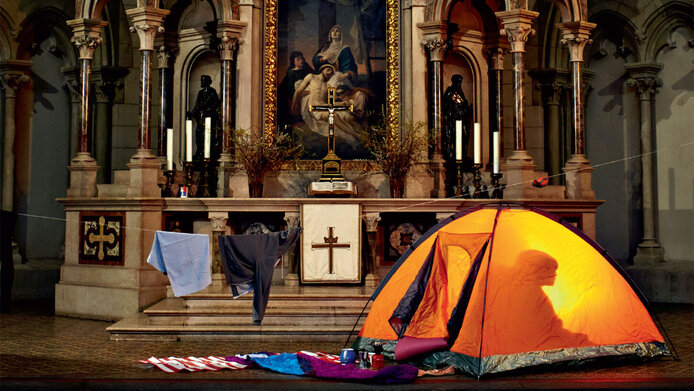Migration as morality politics

More than ever, social debate is focusing on refugees and migration. While policy makers respond with strict laws and regulations, members of the public protest against these or protect asylum seekers threatened with deportation. A stir was caused in Austria in recent years by three cases of asylum seekers destined for deportation who were protected by the church: in July 2018, the Archbishop of Salzburg granted church asylum to 23-year-old Ali Wajid, who was to be deported to Pakistan despite being in the middle of an apprenticeship. In November 2019, the parish priest of Unken in Pinzgau took in 26-year-old Sayed Moshtaq Sadat, who was being threatened with deportation to Afghanistan a few months before his final apprenticeship exam. A month later, the police broke a taboo by entering the cloistered area of the monastery in Langenlois to arrest Ziaulrahman Zaland, an Afghan student who had been taken in by the nuns there.
Church sanctuary has a long tradition
Protecting refugees by granting them church sanctuary is a practice known since ancient times in almost all cultures and religions. In Germany and the USA, there is currently a large church sanctuary movement, says political scientist Julia Mourão Permoser, who conducts research and teaches at the Universities of Innsbruck and Vienna. Some church communities are very open in communicating their willingness to host asylum seekers sought by the authorities.
In the USA, but also in Europe, there are even entire cities that consider themselves “sanctuary cities”. There, administrative staff will not ask about a person's residence status or will not be allowed to pass on such data to the immigration authorities, explains Mourão Permoser. Her research project “Migration as Morality Politics” is funded by the Austrian Science Fund FWF under its Elise Richter programme. In this context she is investigating the moral conflicts surrounding migration in Europe and the USA using a multi-method approach: she conducts in-depth interviews with people who grant church asylum or other forms of “sanctuary”, analysing self-representations and contributions to debates by advocacy groups, and she sheds light on the attitudes of the other side.
Help as a form of protest
The researcher is also studying a third form of support for refugees with irregular status: rescue ships in the Mediterranean, such as the “Sea Watch”, and organisations that rescue refugees from death in the desert between Mexico and the USA. “With their active protests, all of these groups are taking a moral and political stance against the immigration and asylum policies of various countries,” explains Mourão Permoser. In some cases they enter into direct confrontation with the state, as for example when NGOs show resistance to various coercive measures taken by the authorities against rescue ships in the Mediterranean.
Closing the research gap
Although refugee rescue organisations, asylum-granting churches and sanctuary cities pursue “grassroots” migration policy in the name of human rights and humanity, the literature on migration policy has not yet sufficiently taken this phenomenon into account, as Mourão Permoser underlines: “So far, migration research has mainly dealt with security interests or economic interests, but not with ethical values.” In the literature on value conflicts in politics, on the other hand, known as “morality politics”, the role of religions is taken into account in discussions on sexuality, women's rights, abortion, same-sex marriage or stem cell research: all of these being areas where religions usually take a conservative stance. The fact that religious actors take a liberal stance in migration policy is a special phenomenon that has not so far been examined in detail. It is interesting to note that in both cases their attitude is based on the same traditional values – defending human life and human dignity. “With the new focus on the role of values, I have a contribution to make to both migration research and research on morality politics,” says Mourão Permoser.
Personal details
Julia Mourão Permoser is currently a visiting professor at the Department of Political Science at the University of Vienna and principal investigator at the Department of Political Science at the University of Innsbruck. She is also an associate researcher at the Commission for Migration and Integration Research of the Austrian Academy of Sciences and at the European University Institute in Florence. She studied international relations at Georgetown University in Washington, DC and at the Diplomatic Academy of Vienna and holds a PhD in political science. Her project “Migration as Morality Politics” (2019-2024) is receiving roughly EUR 375,000 in funding from the FWF’s Elise Richter Programme, and about EUR 41,000 from the FWF’s Ukraine Support Fund.
Publications
Mourão Permoser, Julia: Democratic Challenges of Church Asylum: Secularism and Rule-of-Law (under review), in: Bauböck, Rainer et al. (eds.) Migrationsforschung und Migrationsgesellschaft: Aktuelle Herausforderungen und neue Perspektiven – Jahrbuch Migrationsforschung 6, Austrian Academy of Sciences Press 2022
Mann, Itamar and Mourão Permoser, Julia: Floating Sanctuaries: The Ethics of Search and Rescue at Sea, in: Migration Studies 2022
Mourão Permoser, Julia: What are morality policies? The politics of values in a post-secular world, in: Political Studies Review, Vol. 17(3), 2019





